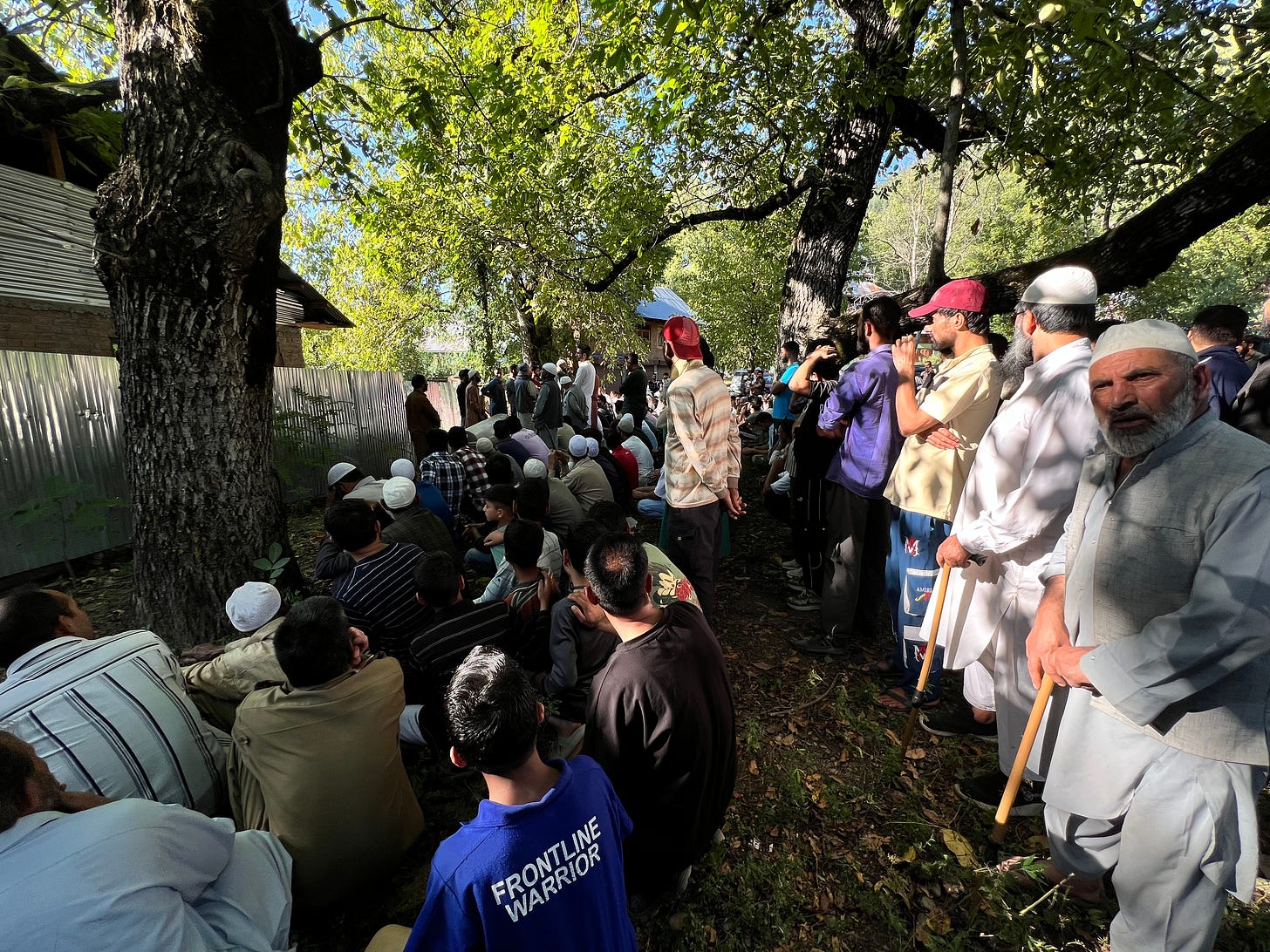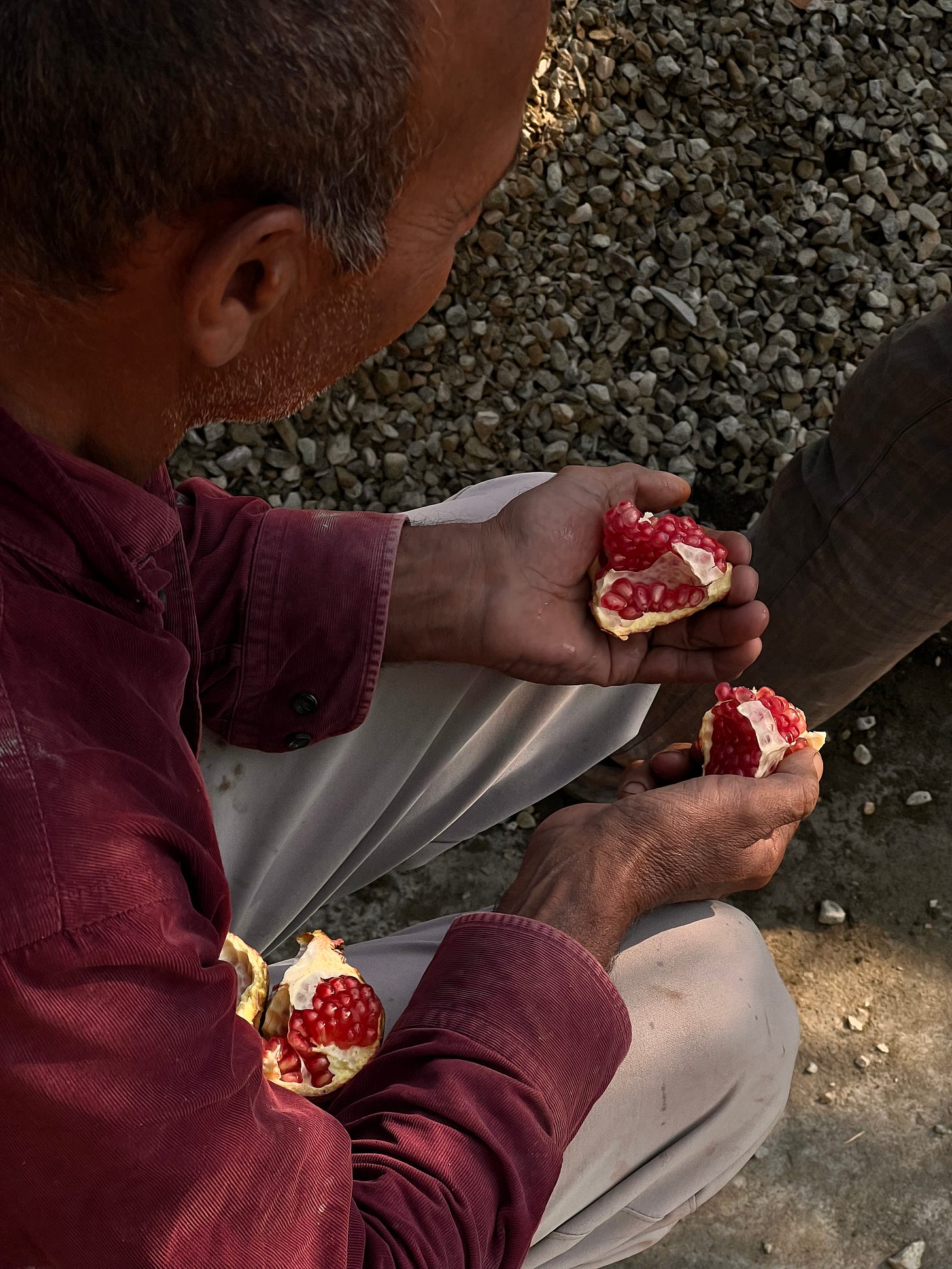To My Faizan, A Final Goodbye
I drove on the same roads today, as I had that day when we ferried his body back to his ancestral village. The flowers along the road reminded me of him, and his smile, so I came home, and wrote this.
Faizan Irshad Ahanger Obituary
Date: 18 September, 2024
When I was driving to Faizan’s village, passing through Baramulla and then Kupwara all the way to Lolab, the paddy fields on either sides of the road were a smudgy golden yellow in color, some harvested and trimmed neatly and some still awaiting their fate in the low hanging afternoon sun, blurring at the edges in this delayed autumn. The air had turned crisp after many months of an unforgiving summer and hit our agonized faces like a balm. Going uphill for at least a hundred kilometres, often through lands of beautiful paddies, it felt like I was visiting Faizan in heaven where he had now found his final resting place. He had breathed his last just a few hours earlier, right as the full moon shone bright in the night sky. I had known that it would be the moon that would take a call on his life.
When I reached his village, half an hour behind the ambulance that ferried his body, I saw in front of me hundreds of people surrounding a small white diaphanous tent (as if made of thinly cut slices of apple) in the epicenter of the crowd under a thick canopy which allowed just enough light to strike the membrane of the tent where it stood. Men, women, and children of this village and the next, and many nearby villages had come to say goodbye to this young boy who had made the arduous journey from Diwar, Lolab to Nowshera, Srinagar many years ago to fend for his family. I was accompanied by Yusuf wasta, Faizan’s favorite mentor, and my favorite wasta as well, and through the crowd of men and women, we floated through until we reached the door of the tent.
We entered the tent when the men of the village had just finished cleaning up Faizan’s body for the final journey. As we came to our senses, our breaths became normal again, our chests stopped heaving under our shirts, and our eyes adjusted to the light inside the tent. Here, Faizan lay in his box of steel, and in the afternoon sun in Lolab shining through the misty walls of the tent, he was glowing. The tiny beads of water that had remained on his body - the residual moisture from the bath - were refracting light a million fold over and like the blurred edges of the paddy fields, the extremities of Faizan’s body were blurring as well, as if floating in light, in a space between here and the after, in the hereafter. At the tips of his jaw, his nose, and his temple, I could see sparkles of light on his now paling skin. “Noor!”, wasta said, as he cried, “Noor, Wallah, Noor!”/ “Divine light, by god, divine light”.
From where I stood, on his left, right by his left temple, it seemed like Faizan had a gentle smile on his face. For the first time in years, Faizan was at rest.
II
To develop a fine skill is a treacherous business. To become a mason, for instance, requires years of patience and showing up. Years of showing up, in turn, requires a life of stability which most of the people in this business of hard earned labor cannot afford on account of family and health which is sacrificed to simply making it out of abject poverty, which one must leap out of every single day. Nobody understands the myth of sisyphus like a labourer earning a day’s wage. One pursuing a path of expertise in masonry, to be employable in the 21st century, requires that one knows all the ways bricklaying can go right, and all the inevitable and the impossibly unpredictable ways it can go wrong, and the latter are infinite. So, when a young apprentice, who thinks he has done enough and learned enough, urges his master to let him become a mason himself, his mentor, if a generous one, puts a hand on his shoulder and asks him to wait, for easy is not the art of mastery. There’s time, he says.
Faizan was unwilling to accept this, and yet with the utmost patience. He had bought for himself a Karni/brick towel which he would carry with him every day. Sack after sack that he ferried on his back, each of which weighed not less than 30 kilos, he then ran back in place to lift his karni and lay a layer of brick. Faizan faced the storm head on, and with a smile.
While on work, he entertained no phone calls and spoke to those around him with no interruption in his work. He had a goal in mind. His house, back home, a one-storied, dilapidated building in Andarbugh, Lolab, 120 kms away from Srinagar, housed a family of 9. Of his house, his neighbors often said, “A gust of wind is all it will take to bring this down”. His father, his mother, and five siblings, all younger than him - all dependent on him for their daily living. A brother - a year or two younger than him - is a spitting image of Faizan himself.
At 18, he was hence already way ahead of some of his masters in the game. He needed to be. Faizan was relentless, and everyone marveled at how he never took a breather and never stopped. With a phone in his pocket gently buzzing away with gentle music or quranic recitations, he soiled away as others sometimes paused. He had the discipline of a man who had been alive, and died, and then came back to life again several times over. People did not understand why he never took a pause or why he never was on his phone, talking to someone who caught his fancy. He was a teenager, after all. His master, often reprimanding many under his command for being lazy, would gently grab Faizan’s forearm many times a day and ask him to sit down and rest. “Have a sip of water, Fizu,” he would tell him. He did not stop. Nobody knew why not. However, when I visited his home for his funeral, I realized why.
Faizan dreamt of becoming a mason so he could mend his broken home, provide for his 5 siblings, and also take care of his parents.
“At the worksite”, his master, Yusuf wasta told me on the way to the funeral, “his ribs would hurt from how much I used to make him laugh. I loved the sound of his laughter. And then, on the day of the accident, it was his ribs that broke first, and then it was through these ribs that a long plastic tube was inserted to drain the fluid that had gathered inside, from within his ruptured spleen and liver.”
When he was cleaned and readied for the other world, he had a mosaic pattern on himself, right by his ribs, almost like the ferns of Kupwara - the ones that grow by the riverside.
That morning, the morning of the incident, he had slept peacefully on his cousin Muneer’s chest, heaving in harmony along with him, finding comfort in the presence of the man who had raised him like his own son, his own brother, and been with him every step of the way. Sabotaging his own career, his cousin Muneer (in the video below, the man on the left) had picked fights with his seniors when they had asked his Faizan to climb a roof or hang off a precarious edge. “He woke up excited that day, because he had been promised by another wasta that he would get to do mason work, work on his skill and make a name for himself”
That fateful day, Faizan had left earlier than he often did. Muneer was to go to another place, perhaps for the first time in years. He was still beginning his day at his room in Srinagar, when he got a call only 30 minutes later. Faizan had fallen to his death from the third story of a mosque he wanted to build the walls of.
At the village, he was unequivocally declared a martyr. Later, he was buried under the shade of many trees.
Three days after the accident, as I had visited him for the first time in the hospital, he had opened his eyes unbeknownst to himself perhaps, and his hands had twitched when I called out his name.
I saw him for not more than 4 days of my life, and when he came to me, I would prepare freshly boiled eggs for his breakfast, along with butter, and I loved watching him eat. He reminded me of my cousin who also shared his name.
Faizan had almost become a full mason. He wanted to build a home for his family, for his siblings and his parents, and had built large parts of my wall too, and as soon as he was ready, very close to ready, fate had other plans. His mentor, who he loved going to work with, said of him that he might have outdone them all, and they loved him for it. “Faizan,” he said, crying, “Faizano” kissing his forehead like a child, “you kept telling me to come visit you in Lolab. I am here, I have come to your home and I have come to see you” he said, as streams of tears trickled down his face, followed by Muneer’s and mine. Faizan was loved by many, and it showed in the ways the birds mourned and it showed in the way they sat in silence, hovering over us, offering for him a namaz-e-janaza.
Faizan, from Andarbugh/Diwar'/Lolab/Kupwara/Kashmir, had come to us as young laborer who helped me spill blood and sweat on and through a dream of mine. Working alongside him, I learned the meaning of the Kashmiri saying “Akh te akh gae kah”/ “one plus one is eleven” because when he and I worked in unison, we did the work of eleven men, and more. In a day’s time, he entered my soul and became the apple of my eye - a boy I would steal away from work just to feed him, to nourish him with food and love. When I heard of him next, I had just returned from a work trip, and he had already fallen to his death, fighting for his life on a hospital bed.
22 may, 2025. Today.
I drove on the same roads today, as I had that day when we ferried his body back to his ancestral village. The flowers along the road reminded me of him and his smile, so I came home, sat down, and published this essay. Somewhere along the road, as I was speaking to Nawal about Faizan, and the bloom that reminded me of him, this bus (below) stopped right in front of us, so I stayed right behind it for a while, and clicked this picture.










Beautiful.
Uff beautiful and heartbreaking. Rest in peace Faizan.